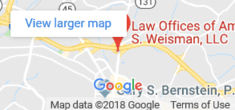Baltimore & Towson Lawyer Discusses Qualified Domestic Relations Orders in Maryland
Amar S. Weisman Is a Family Law Lawyer With Experience Helping Clients Divide Marital Retirement Assets.
Qualified domestic relations orders or QDROs are orders that are typically included in divorce agreements when the parties are dealing with retirement and/or pension funds. More specifically, the order establishes a party's (commonly referred to as an "alternate payee") legal rights with respect to receiving all or a certain percentage of the other party's qualified plan account balance or benefit payments. Your Baltimore and Towson divorce lawyer will also tell you that QDROs are also used to collect child support and/or alimony payments. Given the importance of QDROs, individuals should work with skilled attorneys who will ensure that the document is properly drafted.
The Requirements
In order for a QDRO to be valid under federal law, it must meet certain rules. Individuals should note that a state authority, like a court, must issue a QDRO via a decree, judgment or order that addresses a property settlement. Additionally, the pension and/or retirement plan administrator will, under certain guidelines, be required to make a determination with respect to whether or not a domestic relations order can be a QDRO.
Pension plan participants (or alternate payees) can include a child and/or other dependent, a spouse or a former spouse. Because the payee becomes entitled to the plan money, the individual should note that he or she will be responsible for paying any related income taxes when he or she receives the money in the form of an annuity, pension or withdrawal.
Why and When is a QDRO Needed?
Just about any Baltimore and Towson divorce lawyer will tell you that having a Maryland QDRO will be necessary in order for a person to be legally entitled to a share of his or her spouse's retirement plan. Even if a judge signs a party's divorce decree that contains a brief mention of a plan's dollar amount, that will not suffice. In order for a person's interests to be protected, a QDRO that details specific requirements will need to be signed by a judge.
A QDRO will be needed when an individual and his or her spouse have money in a plan and the parties are separating, in the process of divorcing or are already divorced. That said, it is always best to have a QDRO drafted and signed as soon as possible.
The Benefits of a QDRO
The types, amounts and timing of benefits payable under QDROs will greatly depend on a person's particular circumstances and plan specifics, as well as the wording of the QDRO. Still, there are a few things that individuals should keep in mind when looking into the possibilities. For example, plan benefits may not become payable until a spouse or ex-spouse becomes eligible for such benefits, either through his or her own retirement or death. Additionally, if a former spouse receives a benefit, he or she can defer the taxes by rolling the amount over into an individual retirement account (IRA) within 60 days of receipt.
If you have questions or concerns about whether or not you need a QDRO, contact a Baltimore and Towson divorce lawyer at the Law Offices of Amar Weisman, LLC today.
Call (410) 321-4994 For a Free Consultation
Call The Law Offices of Amar S. Weisman at (410) 321-4994 to schedule a Free Consultation. The Purpose of the consultation is to determine whether you want to retain this law firm as your Baltimore County & Harford County Family Lawyer. If you do wish to proceed, then you must pay a retainer. See Our Policy on Fees and Costs. The family firm is located next to The Circuit Court for Baltimore County, at 1018 Dulaney Valley Road, Towson, MD 21204.

